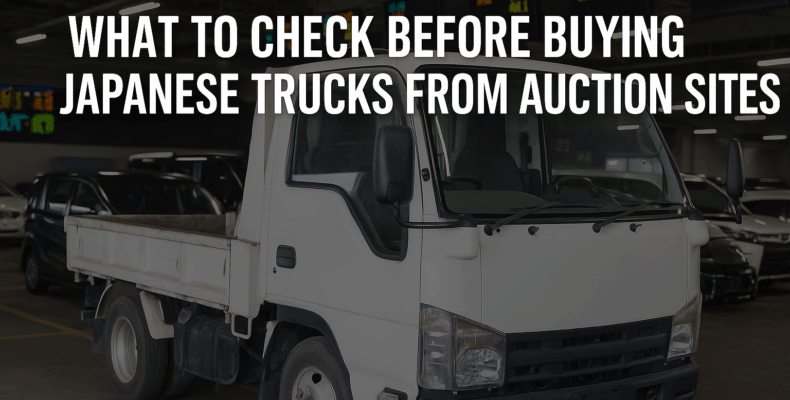🚚 Truck Export & Import Tips: What to Check Before Buying from Auction
Japanese truck auctions offer some of the best deals in the global vehicle market. With thousands of options available every week, buyers from around the world find excellent value in trucks from Hino, Isuzu, Mitsubishi Fuso, and more.
However, auction purchases come with risks—especially for first-time buyers. If you’re not careful, you may end up with a truck that needs unexpected repairs or isn’t eligible for import.
So before you place a bid, make sure to check the following items.
👉 Also, here are the Top 5 Trusted Japanese Used Truck Exporters for Global Buyers
📝 1. Check the Auction Grade
Japanese auctions use a grading system to describe the truck’s condition. Here’s a quick overview:
| Grade | Description |
|---|---|
| 5 | Like new |
| 4.5 | Excellent condition |
| 4 | Minor wear, very clean |
| 3.5 | Noticeable wear, still usable |
| 3 | Rough condition, possible damage |
| R/A | Accident repaired |
| 0 | Heavy damage, needs restoration |
Choose trucks graded 3.5 or higher for best results. If you’re unsure, ask your exporter to explain the condition.
🔧 2. Review the Inspection Sheet Carefully
Every vehicle comes with an auction inspection sheet written by professional inspectors. It includes:
-
Engine condition
-
Transmission status
-
Exterior scratches and dents
-
Rust level
-
Interior damage
Look for codes like:
-
A1, A2 (small scratches)
-
U1, U2 (small dents)
-
W1, W2 (wave or uneven body)
-
X (needs replacement)
Understanding these markings helps you avoid surprises later.
🔎 3. Verify Odometer Readings
Mileage affects value, performance, and import eligibility.
Some countries limit used truck imports by age or kilometers.
Make sure the odometer is not tampered with. A reputable exporter will always provide genuine mileage records.
🚛 4. Confirm the Engine Type and Emissions
Different markets have different import rules. For example:
-
Kenya requires Euro 4 or newer emission standards.
-
Jamaica may ban trucks over 7 years old.
-
Uganda requires diesel engines to meet specific guidelines.
Check the chassis code and engine model to confirm it matches your country’s requirements.
🧾 5. Get Photos from Multiple Angles
Auction listings usually have 2–5 photos.
Ask for underbody, engine bay, interior, and close-up shots if possible.
Good exporters will provide detailed images before shipment.
📦 6. Check for Shipping Readiness
Some auction units may not start or drive. This can affect RoRo shipping eligibility.
If the truck is not drivable, container shipping may be required.
Ask the exporter in advance if the unit is ready to roll.
💼 7. Choose the Right Export Partner
Even if you find a great truck, things can go wrong without the right partner.
Work only with companies that are:
-
Experienced with auction systems
-
Transparent about vehicle condition
-
Supportive through the whole export process
You can find the most reliable partners here:
👉 Top 5 Trusted Japanese Used Truck Exporters for Global Buyers
✅ Conclusion
Buying from a Japanese truck auction can save you money—but only if you know what to look for.
By checking the auction grade, inspection sheet, odometer, and emission specs, you can avoid costly mistakes.
Always ask for more details when in doubt. And most importantly, partner with a trusted exporter.
Ready to explore?
👉 Start with these recommended exporters
